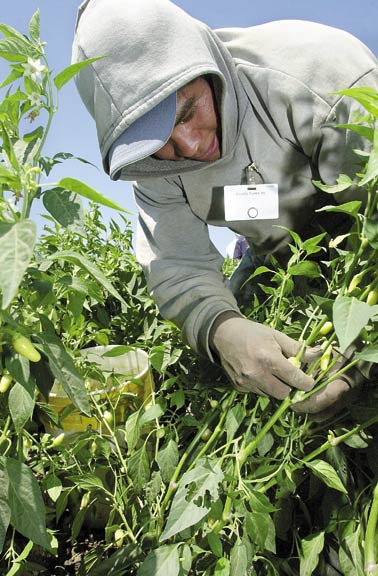Crackdown on illegal immigrants leaves South County farms
shorthanded during harvest time
Morgan Hill – The crackdown on illegal immigrants has left local farmers short of labor as crops lie withering in the summer sun.
An inconsistent number of laborers are showing up for harvesting and local farm production is drastically down. Farms all over South County are feeling the monetary effects of the labor shortage.
“We could feel it early in the [strawberry] season,” said Tim Chiala, director of farm operations at George Chiala Farms in Morgan Hill. “We lost $20,000 to $30,000 worth of strawberries because they got over ripe.”
Most local farms hire labor through contractors and the limited number of available farmworkers has left fields poorly tended.
“We have 30 acres of strawberries and that needs a 50 [person] crew,” Chiala said, “Some days we’d have 30 people and some days we’d have 15. (The strawberries) got over ripe so they had to be picked for processing, which pays less money.”
Chiala said they are wasting thousands of dollars in an effort to keep the farmworkers they already have.
“We’re keeping them employed just to keep them around,” he said.
Instead of normally contacting the labor contractor only when labor is needed for harvesting, Chiala Farms has been paying their laborers for minor work in order to keep the laborers busy and to keep them from going elsewhere between harvests.
“We pretty much pay them for doing nothing just to keep them here,” Chiala said, “which is not ideal.”
Labor shortages are most detrimental to farms during harvests, when picking the produce a day late will mean overripe fruit unfit for sale to grocers.
“The labor shortage, combined with recent heat waves has made it worse. When the heat arrived, labor was even more crucial. It’s not rocket science, the heat matures [produce] more quickly,” said Pete Aiello, co-owner and sales manager of Uesugi Farms Inc., just south of Gilroy on Highway 25. “I would say it’s easily 15 to 20 percent of our normal production [that] has gone by the wayside with the shortage.”
The labor shortage has even impacted production rates for G&K Farms, which grows the less time-sensitive alfalfa on Las Animas Avenue in Gilroy. Kip Brundage, president of G&K Farms of California said they’re 32 percent short on workers and production has greatly decreased.
Although labor on G&K Farms is limited to weeding and irrigation of the fields because harvest is done mechanically, Brundage said he estimates he’s lost about 22 to 30 percent of the produce. The farm grows about 1,000 acres of alfalfa, leaving about 220 to 300 acres of ruined produce.
“The farmworkers are there to run the equipment and to do the irrigation,” he said. G&K Farms usually employs 25 to 30 laborers and this year they have only 10.
More than half the nation’s approximately 1.8 million farmworkers are here illegally, though growers in California believe the percentage here is probably much higher.
Most growers check documents provided by prospective workers to the best of their ability, all the while knowing that fakes are easy to find and that the industry couldn’t make it without the labor of undocumented workers.
This dependence on immigrant labor has turned farmers into strong advocates of immigration reform. They’re pushing hard for a program that would allow guest workers to enter the country legally to work with employers who are waiting, as spelled out in one of the proposals that’s currently stalled in Washington.
Brundage is incensed by the leisurely pace in which Congress mulls over the immigrant worker issue. He said, “Our senate and congress do not realize that agriculture is on a time basis. They keep putting this [issue] off. In agriculture [we] can’t wait. If we lose a crop one year, it’s [another] year before we can raise another crop.”
This year’s pepper season began the first week of August and will end when the frost hits in November or December. “Peppers are the big season [and] this is when we’re going to really see if we’re hurting,” Chiala said, although he also said they have a pretty decent crew right now.
Chiala said the farmworkers get paid more to harvest grapes, and that the two seasons overlap. So when the grape harvest begins in a few weeks further south, there will be an even greater shortage of labor for the peppers.
“Before the labor shortage the labor contractors provided the workers and they came to pick fields,” he said. “Now they have a choice. They’ll look at the fields first and only pick the good ones, leaving the other farms high and dry.”
Associated Press contributed to the story.
by Jessica Thy Nguyen Special to the times








